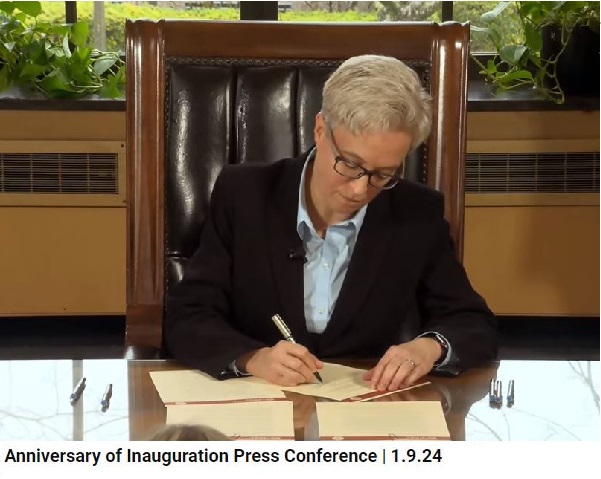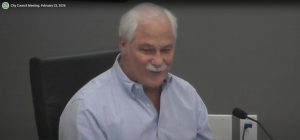Governor announces next steps on homelessness crisis
6 min read
from the Office of the Governor
Gov. Tina Kotek marked one year in office Jan. 9 by reflecting on her first year and signing two new executive orders advancing efforts to tackle the state’s homelessness crisis.
The two new orders come after preliminary data shows that the state exceeded all three goals set in the homelessness state of emergency she issued last year.
“One year ago, I told Oregonians that the homelessness emergency order was only the first step and that it would take collaboration to act at the scale and urgency this humanitarian crisis demands,” Gov. Kotek said. “Now, we are continuing the fight to bring housing stability to more Oregonians.”
She thanked legislators, local governments, shelter providers, and housing providers for stepping up last year and delivering results to address our homelessness crisis.
“We’ve seen that together we can make an impact, and we will continue to push this work forward until every Oregonian has a safe and stable place to call home,” she said.
Preliminary data from Oregon Housing and Community Services shows that the state—working with local partners—created 1,032 low-barrier shelter beds (exceeding the original goal by 432 beds); rehoused 1,293 households experiencing unsheltered homelessness (exceeding the original goal by 93 households); and prevented 8,886 households from experiencing homelessness (exceeding the original goal by 136 households).
The original goals in the emergency order were to create 600 shelter beds, rehouse 1,200 households in emergency areas, and prevent 8,750 households from becoming homeless statewide. Final data for the first year’s outcomes will be available in late February.
Gov. Kotek signed two new executive orders to observe the one-year anniversary of her swearing-in on January 9, 2023.
Gov. Kotek signed EO 24-02 to maintain the added capacity to the state’s shelter system, rehouse people experiencing homelessness, and prevent homelessness. Measurable outcomes for the new order will be developed in collaboration with local communities based on need and capacity and will be announced by the end of February.
Gov. Kotek also signed EO 24-03 to refresh the state’s Interagency Council on Homelessness and direct them to develop plans for the governor’s consideration in response to the analysis done through EO 23-03, an order also signed last January that directed state agencies to prioritize reducing both sheltered and unsheltered homelessness in all areas of the state using their existing statutory authorities. The Council will meet on Jan. 16 to discuss next steps.
Highlights from Gov. Kotek’s first year in office include:
Housing and Homelessness
Homelessness State of Emergency: Declared a homelessness state of emergency on her first full day in office (EO 23-02) and worked with the Legislature to secure $155 million early in the legislative session to fund an emergency package to prevent homelessness, expand shelter capacity, and rehouse people experiencing homelessness. She then successfully worked with the Legislature to continue the work with a $316 million investment in homeless services funding for the 2023-25 biennium.
Affordable Housing Production: Advocated for and worked with the Legislature to secure $650 million to preserve and build more affordable housing statewide.
Housing Production Advisory Council: Convened the Housing Production Advisory Council under EO 23-04 tasked with proposing an action plan to address Oregon’s current housing shortage and keep pace with projected population growth. Their early work informed the governor’s priority bill for the 2024 session, and the Council’s final recommendations will be released at the end of January.
Behavioral Health
Access to Behavioral Health Services: Advocated for and worked with the Legislature to get $200 million to add capacity for detox and substance use disorder residential treatment facilities, provide incentives to stabilize and support the behavioral health workforce, and increase community services for individuals who are likely to end up in the Oregon State Hospital.
Life-Saving Opioid Overdose Reversal Medication: Championed and signed Senate Bill 1043, which requires hospitals, sobering facilities, and detox facilities to provide two doses of opioid overdose reversal medication and necessary medical supplies to administer medication to specified patients upon discharge or release. Also signed House Bill 2395, which expands access to emergency short-acting opioid overdose reversal medications and requires additional reporting and information sharing of opioid overdoses.
Substance Use Disorder Treatment Beds in Portland: Through a joint effort with the state and local government, Central City Concern was able to finalize a contract to purchase a building in Portland’s central city to provide treatment and temporary housing for people experiencing substance use disorders. The contract was finalized in less than two weeks and will add over 70 treatment beds later this year.
$25 Million CCO Partnership for Youth Behavioral Health Services: The partnership was formed in response to record, unanticipated profits among Coordinated Care Organizations (CCOs) accrued during the COVID-19 pandemic. When CCOs provided the governor with a financial accounting of recent community reinvestments, the governor requested CCOs to work together collectively to reinvest an additional $25 million in youth behavioral health services. In response, CCOs collaborated on funding projects that would support statewide access using one-time resources.
Education and Early Childhood
Support for Reading and Writing: Worked with the Legislature to secure increased funding for early literacy and improve how we teach kids how to read and write – ensuring educators, parents, caregivers, sovereign tribal nations, and communities have what they need to support our students by passing and signing House Bill 3198. All 197 school districts across the state have applied for grant funding from the bill to improve how Oregon schools teach kids to read and write.
Educator Preparation for Teaching Students Reading and Writing: Established the Early Literacy Educator Preparation Council in May in order to develop recommendations to raise the bar on elementary educator preparation for reading and writing instruction.
Public Safety
Law Enforcement Training: Directed the Department of Public Safety Standards and Training (DPSST), with new funding from the Legislature, to expand the capacity to train new officers to meet workforce challenges across the state.
Fentanyl Enforcement: Directed Oregon State Police to deploy enhanced fentanyl enforcement strategies.
Livability: Used $1 million from the governor’s Strategic Reserve Fund to support an expansion of the Clean Start program that employs individuals who recently experienced homelessness to clean up trash in Portland, combined with $1.5 million from Multnomah County.
Economic Development
Oregon CHIPS Act: Signed Senate Bill 4 to bring new state investment to semiconductor research and manufacturing to make Oregon competitive for federal resources from the federal CHIPS and Science Act. Business Oregon led an expedited process to start issuing contracts this month.
Portland Central City Task Force: Convened a task force of community leaders to deliver 10 concrete near-term solutions to Portland’s most pressing challenges and a vision for its economic future, presenting the recommendations at the annual Oregon Business Summit.
Paid Leave Oregon: Launched the new program that has, in its first four months, provided benefits to tens of thousands of Oregonians, allowing them to take paid time off from work to care for themselves or loved ones dealing with serious health conditions, to bond with a new child, or to address the impacts of domestic violence, sexual assault, harassment, and stalking.
Climate and Environment
Regional Clean Hydrogen Hub: The U.S. Department of Energy (DOE) announced that the Pacific Northwest Hydrogen Association’s PNWH2 Hub was selected as one of the Regional Clean Hydrogen Hubs following a competitive nationwide process. The Hub is eligible to receive up to $1 billion in federal funding over four DOE-defined development phases spanning nine years.
Climate Resiliency: Signed a comprehensive package in House Bill 3409 to help Oregon invest in clean energy, energy efficiency, clean transportation, and other strategies to reduce climate pollution.
Reproductive Health
Access to Reproductive Health Care: Signed House Bill 2002 into law, protecting access to reproductive health care and providing state funding to support the work of community organizations and clinical partners to ensure that people in more parts of the state have access to the reproductive health care they need.
Mifepristone Supply: Gov. Kotek partnered with Oregon Health and Science University (OHSU) to secure a three-year supply of Mifepristone in preparation of the U.S. Supreme Court decision that could limit access to medication abortion.
Reproductive Health Equity Act Enforcement: The Department of Consumer and Business Services (DCBS) conducted and published a comprehensive review of insurer compliance with Oregon’s Reproductive Health Equity Act (RHEA) and found that Oregon insurers had failed to fully comply with the law in several areas, including imposing cost sharing for services covered by RHEA. DCBS implemented corrective action plans as well as ongoing data reporting and compliance monitoring for each insurer to ensure Oregonians receive the health benefits they are entitled to under the law.
One Oregon Listening Tour
Listening to Lead: Kept promise to visit all 36 counties, building strong, working partnerships across Oregon and listening to Oregonians in their home communities to hear their hopes, challenges, and how the state can be a partner on key priorities and issues unique to each county.




